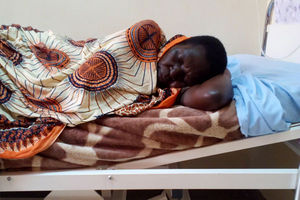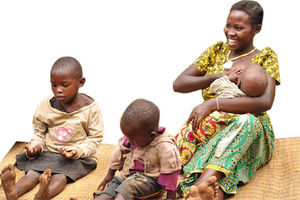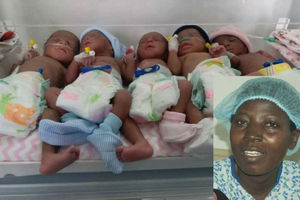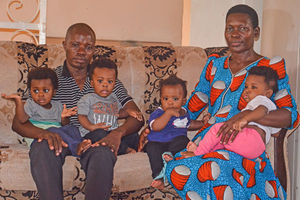
The father of the four new-borns, all girls, is a student and grappling with the huge responsibility.
Miriam (not real name) sits inside the neonatal intensive care unit (NICU) ward at Mbale Regional Referral Hospital hovering over her set of newborn babies, quadruplets.
The NICU is a hospital ward with specialist medical staff and equipment provided to care for premature and sick newborn babies.
Miriam, 16, a former Primary Six pupil, delivered her children when she was only 29 weeks pregnant. It was her first pregnancy and it was a normal delivery. The average length of human gestation is 280 days, or 40 weeks, from the first day of the pregnant woman's last menstrual period, according to the Johns Hopkins Hospital, United States of America.
It all started on September 1 when Miriam started experiencing labour pains. She first went to a nearby health facility, which quickly referred her to Busolwe General Hospital where she gave birth to the four babies. According to medical workers at Busolwe General Hospital, all the newborn babies are girls, weighing 1.3 kg, 1.2 kg, 1.1 kg, and 1.4 kg. When we visited, seven days after Miriam was admitted, two babies were still in the incubator while two others were on a hospital bed, each covered with a little blanket. They were fast asleep and their mother stood near the bed, visibly happy. Despite the fact that the babies were healthy, they were still in the hospital being closely monitored by medical personnel at Mbale Regional Referral Hospital.
Dr Julian Abeso, the head of paediatrics at Mbale hospital, said the babies were premature and added: "We are managing them and they are in good health."
The young parents were overjoyed and expressed their gratitude, thanking God for the gift of quadruplets. They were also surprised to learn that they had four children, when Miriam gave birth.
“I visited Butaleja Health III for my antenatal care but I was told that I have two babies [twins]. Even the scan showed two babies, but to my surprise I gave birth to four babies,” Miriam said.
Despite the excitement, the parents are aware of the responsibility on their shoulders and are worried about how they will fend for the children.
“I’m still at school and I don’t have a job. I come from a poor family. I don’t know how I will raise these children. I request for support from everyone in and outside the country,” the 17-year-old father of the quadruplets said.
They are not the only ones who are worried. Their parents too are concerned. When a team from this publication visited Mukasa (not real name), the father of Miriam we found him busy with his routine metal work that he does during the evenings after he has finished working in the garden.
Apart from growing food, Mr Mukasa makes charcoal stoves and metallic boxes to earn a living. The family lives in a small grass-thatched structure. He too was happy to hear that Miriam delivered the babies safely.
“I was happy when I got the good news that my beloved daughter had delivered four babies. I thank Allah for giving my daughter four babies. Many of my relatives have produced twins and triplets several times. This is a gift from Allah,” Mukasa said. But, he highlighted the complex social challenges facing the young family, saying it has him deeply worried about the financial strain and he wondered how he was going to take care of the babies since is a peasant. “When Allah is the provider, he will handle the situation,” he said.
Mr Mubiru also plans to take Miriam, who had dropped out of school after becoming pregnant, back to school once the financial means are available because the family believes she has a brighter future if she gets an education. Although his family faces an uncertain future as they grapple with the immense responsibility of caring for their daughter and her newborn children, Mukasa is hopeful.
According to Ms Betty Nesihwe, the Butaleja District senior probation and welfare officer, efforts are being made to support Miriam.





